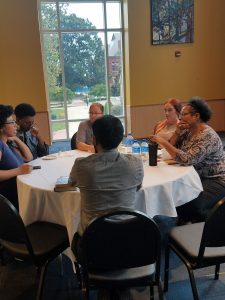Posted on 10/15/2018
 The Women’s and Gender Studies Program offers a sincere thanks to all who joined us in welcoming science fiction and fantasy author Nalo Hopkinson on Wednesday, September 26, at 4pm for the Dylan Rose and Eloise Kadis Rose Women’s Lecture Series. Introducing Hopkinson, Dr. Mark Rifkin noted of her work, “In addition to being gripping, it engages us in a powerful thinking about the politics of how the world was, is, and might be.”
The Women’s and Gender Studies Program offers a sincere thanks to all who joined us in welcoming science fiction and fantasy author Nalo Hopkinson on Wednesday, September 26, at 4pm for the Dylan Rose and Eloise Kadis Rose Women’s Lecture Series. Introducing Hopkinson, Dr. Mark Rifkin noted of her work, “In addition to being gripping, it engages us in a powerful thinking about the politics of how the world was, is, and might be.”
Hopkinson’s opening statement places “all fiction [as] a subset of fantasy.” According to Hopkinson, fantasy has several functions: “It is how we develop tools and technology; it keeps us out of danger and [it] helps us understand one another.” She attributes the genre’s popularity to the idea that “science fiction is about novelty; it challenges biases about how the world works.”
Hopkinson is a Professor of Creating Writing at the University of California,Riverside. Acknowledging science fiction and fantasy writing are discouraged in much of academia, she has been influential in promoting their recognition, already affecting change within UC Riverside. Hopkinson helped create a research cluster offering a designated Science Fiction concentration to PhD students. Throughout her lecture, she encouraged those interested in the genre not to let bias against science fiction in university writing departments discourage them from pursuing their interests.
Often science fiction writing is not considered a “worthy” pursuit in academia. The word worthy came up several times during Hopkinson’s 45-minute lecture as she challenged the audience to examine their understanding of the word and redefine their notion of what it is and is not labeled “worthy.”
Hopkinson, who is not only a woman of color, but also identifies as queer and disabled, continually disrupts the notion that only men can create quality science fiction. She emphasizes the importance of breaking down stereotypes, referencing a cover from the Lightspeed series of magazines featuring an older woman as part of its cast of characters. Hopkinson shared that her first book was published when she was 35, and before publication, she had faced numerous obstacles—all of which she successfully overcame. Even though authors and publishers are often biased against women, creating barriers to success, Hopkinson reassures writers, “Don’t be scared. You have allies. Find us.”
Hopkinson deconstructs the notion that science fiction is a male dominated field, claiming just because women authors are now beginning to gain acknowledgment does not mean they just started writing science fiction. As evidence, Hopkinson provided the audience with a historical survey of female science fiction writers dating back to the seventeenth century, exposing her audience to a whole new world of authors.
Hopkinson’s own career inspirations were inspired while reading a book by author Robert Heinlein, leaving her dismayed at the way women were portrayed. In her own words, “I threw the book at the wall and a feminist was born.” Hopkinson defines feminism as “a political sensibility fueled by the definition that women are people.”
The title and theme of the lecture, “We’re Here, Too: Feminism in Science Fiction and Fantasy” reflects an awareness that things need to change. Responding to the critical claim that “women are destroying sci-fi,” she shares emphatically “I hope so.” Hopkinson provided several suggestions for how writers and non-writers can help bring the contributions of women science-fiction writers into the spotlight; thereby breaking down some of the barriers blocking progress.Reading books by women authors and nominating female authors for awards are starting points. Teachers can expand their repertoire to include female sci-fi authors. Hopkinson also notes publishers can help, too. Printing more works by women will go a long way toward encouraging women to pursue writing careers.
As she noted, women may need more encouragement due to the long history of discrimination and rejection toward female authors. Hopkinson’s message to publishers is “If you want us, tell us.”